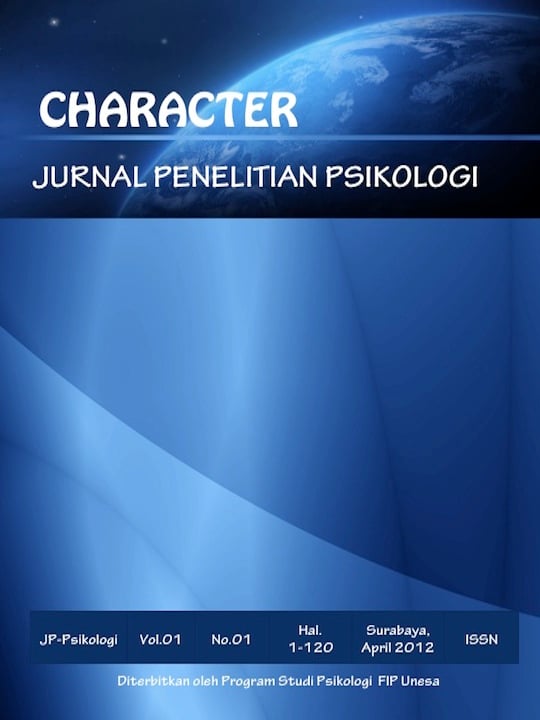SELF ACCEPTANCE PADA REMAJA DENGAN DISLEKSIA
DOI:
https://doi.org/10.26740/cjpp.v8i1.38526Abstract
Abstrak
Disleksia adalah gangguan berbahasa yang berpengaruh dalam hal membaca, menulis, berbicara dan mendengarkan. Ini adalah disfungsi atau gangguan dalam penggunaan kata-kata. Disleksia merupakan salah satu gangguan perkembangan fungsi otak yang terjadi sepanjang rentang hidup berdasarkan penyebab internal pada individu tersebut. Pada penelitian ini, peneliti ingin meneliti bagaimana self acceptance pada remaja dengan disleksia. Penerimaan diri adalah keinginan untuk memandang diri seperti adanya, dan mengenali diri sebagaimana adanya. Penelitian ini bertujuan untuk mendiskripsikan mengenai gambaran penerimaan diri pada remaja disleksia dan untuk memahami faktor-faktornya yang mempengaruhi penerimaan diri remaja disleksia tersebut. Penelitian ini menggunakan penelitian kualitatif studi kasus, yaitu dengan mengolah data yang sifatnya deskriptif, seperti; transkip wawancara, catatan lapangan, gambar foto, dan lain-lain. Subjek dalam penelitian ini berjumlah 2 orang. Subjek 1 dalam penelitian ini berinisial R yang berusia 18 tahun, subjek 2 berinisial M yang berusia 18 tahun dengan masing-masing 2 significant others. Hasil dalam penelitian ini mengungkapkan bahwa anak dengan disleksia dapat memiliki penerimaan diri yang baik karena adanya faktor-faktor yang menunjang penerimaan diri seseorang, yaitu; adanya pemahaman tentang diri sendiri, adanya harapan yang realistik, tidak adanya hambatan didalam lingkungan, sikap-sikap anggota masyarakat yang menyenangkan, tidak adanya gangguan emosional yang berat, pengaruh keberhasilan yang dialami, baik secara kualitatif maupun kuantitatif, identifikasi dengan orang yang memiliki penyesuaian diri yang baik, adanya perspektif diri yang luas, pola asuh dimasa kecil yang baik, konsep diri yang stabil.
Kata Kunci: disleksia, self acceptance
AbstractDyslexia is a language disorder which influences reading, writing, speaking and listening. This is a dysfunction or disruption in the use of words. Dyslexia is one of the developmental disorders of brain function that occurs throughout the life span based on internal causes in these individuals. . In this study, researchers wanted to examine how self-acceptance in adolescents with dyslexia. Self acceptance is the desire to see oneself as it really is, and recognize oneself as they really are. This study is to describe the picture of self acceptance in dyslexic adolescents and to understand the factors that influence the self-acceptance of dyslexic adolescents This study uses qualitative case study research, anamely by processing descriptive data, such as; interview transcripts, field notes, photographic images, video recordings, and others. The subjects in this study were 2 people. Subject 1 in this study had the initial R aged 18 years, subject 2 had the initial M aged 18 years with 2 significant others each. The results in this study reveal that children with dyslexia can have good self acceptance because of the factors that support self acceptance, that are; have self understanding, realistic expectations, no obstacles in the environment, pleasant attitude of community members, the absence of severe emotional disturbances, the effect of success experienced, both qualitatively and quantitatively, identification with people who are well adjusted, have a perspective broad self, good parenting in childhood, stable self-concept.
Keywords: dyslexia, self acceptance
Downloads
Downloads
Published
How to Cite
Issue
Section
License
Authors who publish in this journal agree to the following terms:
Copyright in any article is held by the author.
The author grants the journal, publication rights with the work simultaneously licensed under a Creative Commons Attribution License that allows others to share the work with an acknowledgment of the work's authorship and initial publication in this journal.
Authors may enter into separate, additional contractual arrangements for the non-exclusive distribution of the journal's published version of the work (e.g., posting it to an institutional repository or publishing it in a book), with an acknowledgment of its initial publication in this journal.
Authors are permitted and encouraged to post their work online (e.g., in an institutional repository or on their website) prior to and during the submission process, as this can lead to productive exchanges, as well as earlier and greater citation of published work.
 Abstract views: 789
,
Abstract views: 789
, PDF Downloads: 546
PDF Downloads: 546





